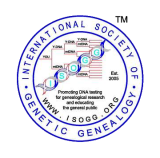Haplotype
From ISOGG Wiki
A haplotype (also known as a signature, a DNA signature, or a genetic signature) is a set of markers (polymorphisms) on a single chromosome that tend to be inherited together. A haplotype can refer to a combination of alleles, to a set of short tandem repeats (STRs), or to a set of single nucleotide polymorphisms (SNPs). Haplotype is a contraction of the term haploid genotype.
In genetic genealogy the term is normally applied to the letters or numbers obtained from the results of a genealogical DNA test. Haplotypes can consist of varying numbers of markers depending on the test taken and therefore exist at different resolutions.
Whenever the term haplotype or signature is used, it is advisable to clarify the intended meaning in the context in which it is being used.
Y-DNA haplotype
In the context of Y chromosome DNA test results the haplotype usually refers to the marker (allele) values obtained from a Y-STR (short tandem repeat) test. The result for each marker is expressed as a number. With the advent of Y chromosome full sequencing, SNP information combined with STR data can provide a more precise haplotype.
In surname DNA projects the term may refer to an individual, group or modal haplotype or signature.
mtDNA haplotype
The mtDNA haplotype refers to the results obtained from a mitochondrial DNA test. Results are compared either with the revised Cambridge Reference Sequence or the Reconstructed Sapiens Reference Sequence. The DNA letters or bases that differ from the reference sequence are reported.
External links
- SciTable definition of haplotype
- Wikipedia article on haplotype
- Haplotype versus haplogroup — the difference between haplogroup & haplotype explained by Charles Kerchner.
- Measuring haplotype rarity An extended essay by Ralph Taylor, administrator of the Taylor DNA Project
- Haplotype stability by Ralph Taylor
Sources
The sources used to compile this definition include:
- The ISOGG SNP tree glossary.
- Talking Glossary of Genetic Terms from the National Human Genome Research Institute.
- Aulicino E. Genetic Genealogy; The Basics and Beyond. Author House, 2013, p245.
- Kennett D. DNA and Social Networking. Stroud, Gloucestershire: The History Press, 2011, p211.
- Pomery C. Family History in the Genes. London: The National Archives, p225.
- Smolenyak M, Turner A. Trace Your Roots with DNA. Rodale Inc, 2004. p253.
